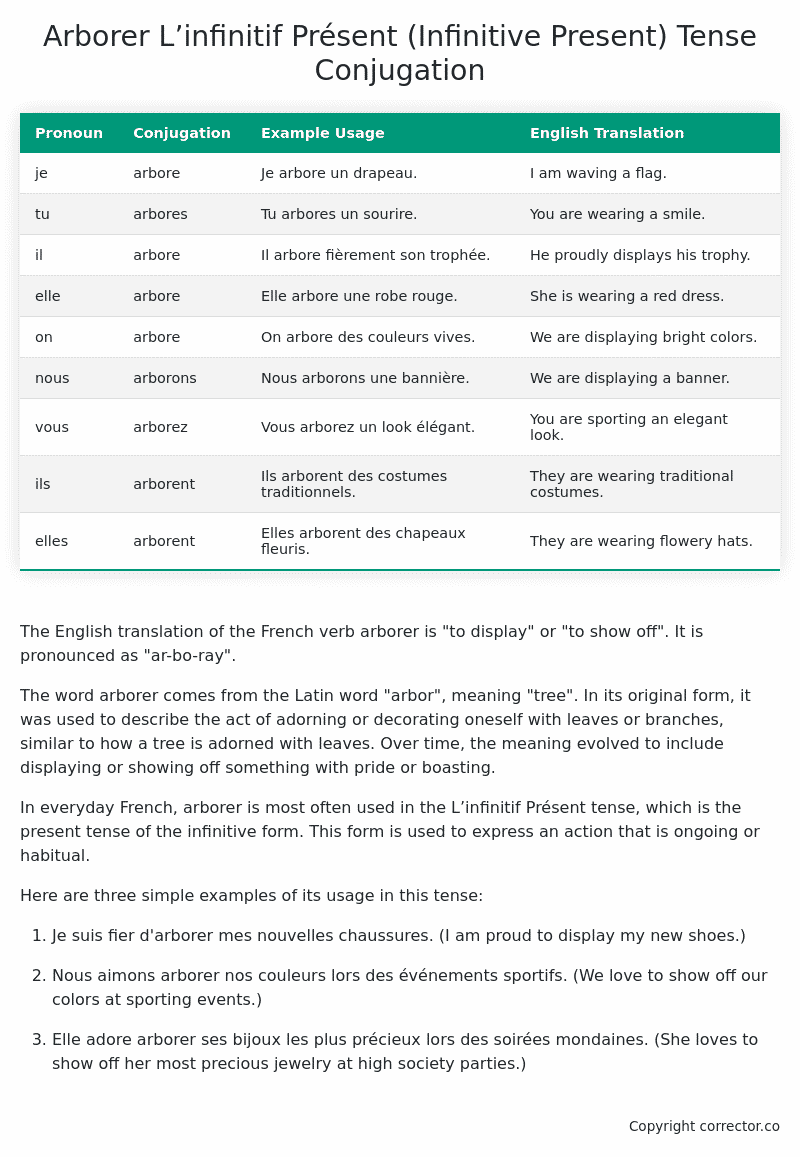L’infinitif Présent (Infinitive Present) Tense Conjugation of the French Verb arborer
Introduction to the verb arborer
The English translation of the French verb arborer is “to display” or “to show off”. It is pronounced as “ar-bo-ray”.
The word arborer comes from the Latin word “arbor”, meaning “tree”. In its original form, it was used to describe the act of adorning or decorating oneself with leaves or branches, similar to how a tree is adorned with leaves. Over time, the meaning evolved to include displaying or showing off something with pride or boasting.
In everyday French, arborer is most often used in the L’infinitif Présent tense, which is the present tense of the infinitive form. This form is used to express an action that is ongoing or habitual.
Here are three simple examples of its usage in this tense:
-
Je suis fier d’arborer mes nouvelles chaussures. (I am proud to display my new shoes.)
-
Nous aimons arborer nos couleurs lors des événements sportifs. (We love to show off our colors at sporting events.)
-
Elle adore arborer ses bijoux les plus précieux lors des soirées mondaines. (She loves to show off her most precious jewelry at high society parties.)
Table of the L’infinitif Présent (Infinitive Present) Tense Conjugation of arborer
| Pronoun | Conjugation | Example Usage | English Translation |
|---|---|---|---|
| je | arbore | Je arbore un drapeau. | I am waving a flag. |
| tu | arbores | Tu arbores un sourire. | You are wearing a smile. |
| il | arbore | Il arbore fièrement son trophée. | He proudly displays his trophy. |
| elle | arbore | Elle arbore une robe rouge. | She is wearing a red dress. |
| on | arbore | On arbore des couleurs vives. | We are displaying bright colors. |
| nous | arborons | Nous arborons une bannière. | We are displaying a banner. |
| vous | arborez | Vous arborez un look élégant. | You are sporting an elegant look. |
| ils | arborent | Ils arborent des costumes traditionnels. | They are wearing traditional costumes. |
| elles | arborent | Elles arborent des chapeaux fleuris. | They are wearing flowery hats. |
Other Conjugations for Arborer.
Le Present (Present Tense) Conjugation of the French Verb arborer
Imparfait (Imperfect) Tense Conjugation of the French Verb arborer
Passé Simple (Simple Past) Tense Conjugation of the French Verb arborer
Passé Composé (Present Perfect) Tense Conjugation of the French Verb arborer
Futur Simple (Simple Future) Tense Conjugation of the French Verb arborer
Futur Proche (Near Future) Tense Conjugation of the French Verb arborer
Plus-que-parfait (Pluperfect) Tense Conjugation of the French Verb arborer
Passé Antérieur (Past Anterior) Tense Conjugation of the French Verb arborer
Futur Antérieur (Future Anterior) Tense Conjugation of the French Verb arborer
Subjonctif Présent (Subjunctive Present) Tense Conjugation of the French Verb arborer
Subjonctif Passé (Subjunctive Past) Tense Conjugation of the French Verb arborer
Subjonctif Imparfait (Subjunctive Imperfect) Tense Conjugation of the French Verb arborer
Subjonctif Plus-que-parfait (Subjunctive Pluperfect) Tense Conjugation of the French Verb arborer
Conditionnel Présent (Conditional Present) Tense Conjugation of the French Verb arborer
Conditionnel Passé (Conditional Past) Tense Conjugation of the French Verb arborer
L’impératif Présent (Imperative Present) Tense Conjugation of the French Verb arborer
L’infinitif Présent (Infinitive Present) Tense Conjugation of the French Verb arborer (this article)
Struggling with French verbs or the language in general? Why not use our free French Grammar Checker – no registration required!
Get a FREE Download Study Sheet of this Conjugation 🔥
Simply right click the image below, click “save image” and get your free reference for the arborer L’infinitif Présent tense conjugation!

Arborer – About the French L’infinitif Présent (Infinitive Present) Tense
Forming the Infinitive Present
Common Everyday Usage Patterns
As a Verb’s Dictionary Form
After Modal Verbs
As an Imperative
In Infinitive Clauses
Interactions with Other Tenses
Present Tense
Future Tense
Conditional Tense
Passé Composé
Imperfect Tense
Subjunctive and Conditional Moods
Summary
Want More?
I hope you enjoyed this article on the verb arborer. Still in a learning mood? Check out another TOTALLY random French verb conjugation!


